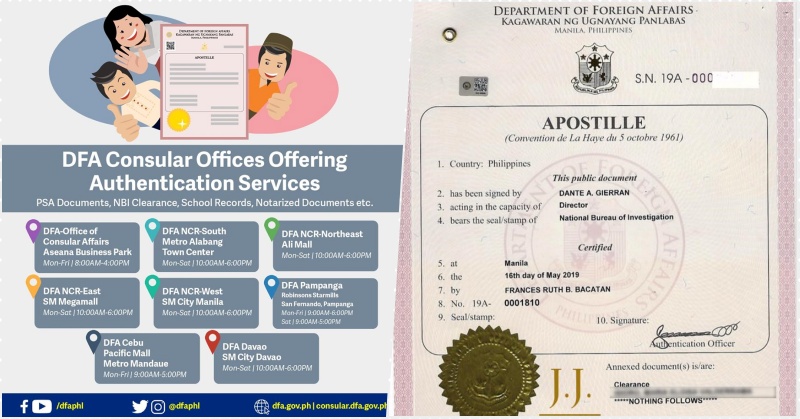Last year, the Department of Foreign Affairs (DFA) announced that it will be implementing a change in the process of authenticating documents.
Effective May 14, 2019, the DFA will no longer issue Authentication Certificates and will instead affix an Apostille to documents for use abroad as proof of authentication for use in Apostille-contracting parties.

DFA Consular Offices to Authenticate Your Documents
With this change put into effect, many people have inquired regarding the Apostille, the documents it applies to, the benefits of getting one, associated fees, and where it can be availed.
In this post, we will share information on DFA Consular offices where you can avail document authentication services all over the Philippines:
LUZON (Metro Manila)
- DFA-Office of Consular Affairs Aseana Business Park
Office hours: 8:00 am – 4:00 pm, Monday to Friday
- DFA NCR-South Metro Alabang Town Center
Office hours: 10:00 am – 6:00 pm, Monday to Saturday
- DFA NCR-Northeast Ali Mall
Office hours: 10:00 am – 6:00 pm, Monday to Saturday
- DFA NCR-East SM Megamall
Office hours: 10:00 am – 6:00 pm, Monday to Saturday
- DFA NCR-West SM City Manila
Office hours: 10:00 am – 6:00 pm, Monday to Saturday
- DFA Pampanga Robinsons Starmalls, San Fernando, Pampanga
Office hours: 9:00 am – 6:00 pm, Monday to Friday
9:00 am – 5:00 pm, Saturday
VISAYAS
- DFA Cebu Pacific Mall Metro Mandaue
Office hours: 9:00 am – 5:00 pm, Monday to Friday
MINDANAO
- DFA Davao SM City Davao
Office hours: 10:00 am – 6:00 pm, Monday to Saturday
Upon authentication of the DFA, there is no more need for authentication (legalization) by the concerned Foreign Embassies or Consulates General if the country or territory of destination of the authenticated document is already a member of the Apostille Convention.
This means that public documents executed in Apostille-contracting countries and territories (except for Austria, Finland, Germany, and Greece) to be used in the Philippines no longer have to be authenticated by the Philippine Embassy or Consulate-General once Apostillized.
However, do note that in countries and territories which are not Apostille-contracting parties, the previous process of authentication (red ribbon) applies. This means that documents still have to be authenticated by the Philippine Embassy or Consulate-General before they can be used in the Philippines.
For the updated list of Apostille-contracting parties, please visit this link.
Meanwhile, authentication fees will remain at PhP 100 (regular processing) and PhP 200 (expedited processing) per document.
To know more about the Apostille and how it works, you may visit the DFA’s official website or follow them on Facebook.
ALSO READ: ADVISORY – No More Red Ribbon Affixed on PH Documents